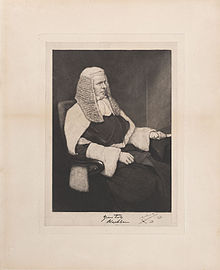Colin Blackburn, Baron Blackburn
British judge (1813-1896)
(Redirected from Colin Blackburn)
Colin Blackburn, Baron Blackburn (1813 – 8 January 1896) was a Scottish judge who sat in the English courts, became a Law Lord and is remembered as one of the greatest exponents of the common law.

Quotes edit
- I think that it must in every case depend upon the nature of the transaction, whether the fact not disclosed is such, that it is impliedly represented not to exist; and that must generally be a question of fact proper for a jury.
- Lee v. Jones (1864), 17 C. B. (N. S.) 506.
- Judges could by their resolution alter the practice, but never the law.
- Reg. v. Charlesworth (1861), 9 Cox, C. C. 67.
- I do not think there can be the smallest doubt that to sit judicially on Sunday on any business would be indecent and improper, and ought never to be done if it can be helped.
- Winsor v. The Queen (1866), L. R. 1 Q. B. D. 317.
- It has been a general rule for drawing deeds and other legal documents from the earliest times, which one is taught when one first becomes a pupil to a conveyancer, never to change the form of words unless you are going to change the meaning, and it would be as well if those who are engaged in the preparation of Acts of Parliament would bear in mind that that is the real principle of construction.
- Hadley v. Perks (1866), L. R. 1Q. B. 457.
- Whenever there is a real likelihood that the Judge would, from kindred or any other cause, have a bias in favour of one of the parties, it would be very wrong in him to act, and we are not to be understood to say that where there is a real bias of this sort this Court would not interfere.
- Reg. v. Rand (1867), L. R. 1 Q. B. 230.
- Whatever may be the case in a Court of morals, there is no legal obligation on the vendor to inform the purchaser that he is under a mistake, not induced by the act of the vendor.
- Smith v. Hughes (1871), L. R. 6 Q. B. 607.
- The phrase "contempt of court" often misleads persons not lawyers, and causes them to misapprehend its meaning, and to suppose that a proceeding for contempt of court amounts to some process taken for the purpose of vindicating the personal dignity of the Judges, and protecting them from personal insults as individuals. Very often it happens that contempt is committed by a personal attack on a Judge or an insult offered to him; but as far as their dignity as individuals is concerned, it is of very subordinate importance compared with the vindication of the dignity of the Court itself; and there would be scarcely a case, I think, in which any Judge would consider that, as far as his personal dignity goes, it would be worth while to take any steps.
- Skipworth's Case (1873), L. R. 9 Q. B. Ca. 232.
- The rule of our law is that the immediate cause, the causa proxima, and not the remote cause, is to be looked at: for, as Lord Bacon says: "It were infinite for the law to judge the causes of causes and their impulsions one of another; therefore it contenteth itself with the immediate cause, and judgeth of acts by that, without looking to any further degree."
- Sneesby v. Lancashire and Yorkshire Rail. Co. (1874), L. R. 9 Q. B. Ca. 267.